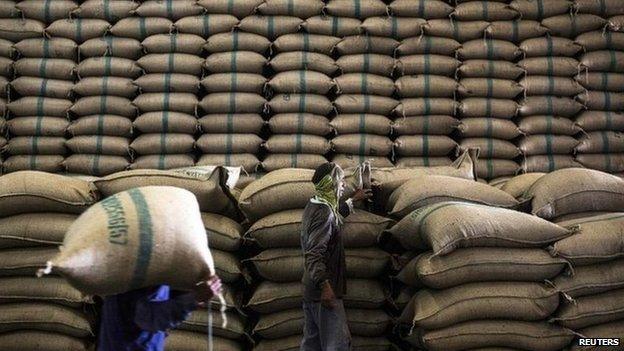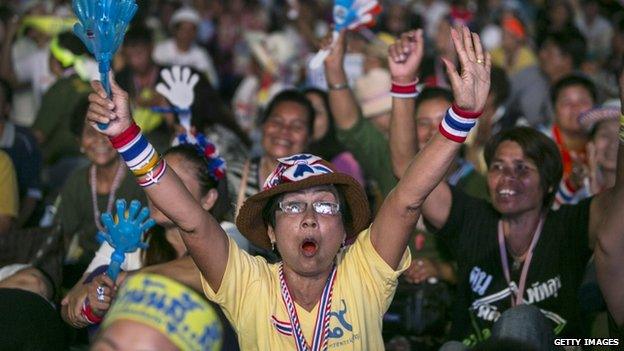China cancels Thailand rice deal amid probe
- Published

Thailand has been buying rice from farmers at prices higher than world prices
Thailand has announced that a contract to sell more than a million tonnes of rice to China has been cancelled.
The Ministry of Commerce said the Chinese government pulled out of the the deal to buy 1.2 million tonnes of rice because of an ongoing probe.
Thailand's Anti-Corruption Commission is investigating PM Yingluck Shinawatra over a rice purchase policy.
The policy has been a factor in the anti-government protests that have sparked Thailand's political crisis.
The deal with China would have been the first stage of what the Thai government was hoping to be a larger shipment of rice this year.
"China lacks confidence to do business with us after the National Anti-Corruption Commission started investigations into the transparency of rice deals between Thailand and China," Thai Commerce Minister Niwatthamrong Bunsongphaisan said, announcing the cancellation.

Anti-government protesters have been occupying parts of Bangkok since last year
The rice purchase scheme, introduced by Ms Yingluck's governing Pheu Thai party, has seen the government buying farmers' crops for the past two years at prices up to 50% higher than world prices.
Now the government needs to sell its stocks to pay farmers, many of whom have not been paid for their October crop.
Some of the farmers have started to protest over not receiving payment and have threatened to join the anti-government demonstrations occupying parts of Bangkok.
The government blames the payment delay on the occupation of ministries by the protesters; until a new parliament can convene, it is barred from borrowing to fund rice purchases, the BBC's Jonathan Head in Bangkok says.
Critics have also condemned the rice purchase scheme as too costly and vulnerable to corruption, our correspondent adds.
Political limbo
Thailand's Anti-Corruption Commission said on 16 January that it was investigating Ms Yingluck for possible negligence of duty over the rice scheme.
The anti-government protesters, who are blockading parts of Bangkok and disrupted Sunday's general election, cite the policy as an example of what they describe as the Yingluck government's use of state resources to buy rural votes.
The ruling party - under various names - has won the last five elections, with strong support from its rural support base.
The protesters want the government to be replaced by an unelected "people's council" that would oversee reform of the political system.
Ms Yingluck called Sunday's general election in response to the protests.
The opposition Democrat Party boycotted the election and there was no voting in provinces where it enjoys support. Protesters prevented voters from casting ballots at some polling stations in Bangkok.
Ms Yingluck's party is expected to win the election, but legal challenges and a lack of MPs as a result of the disruption to voting may create political limbo.
- Published28 January 2014
- Published19 December 2013
- Published29 August 2013
- Published24 October 2012
- Published13 June 2012